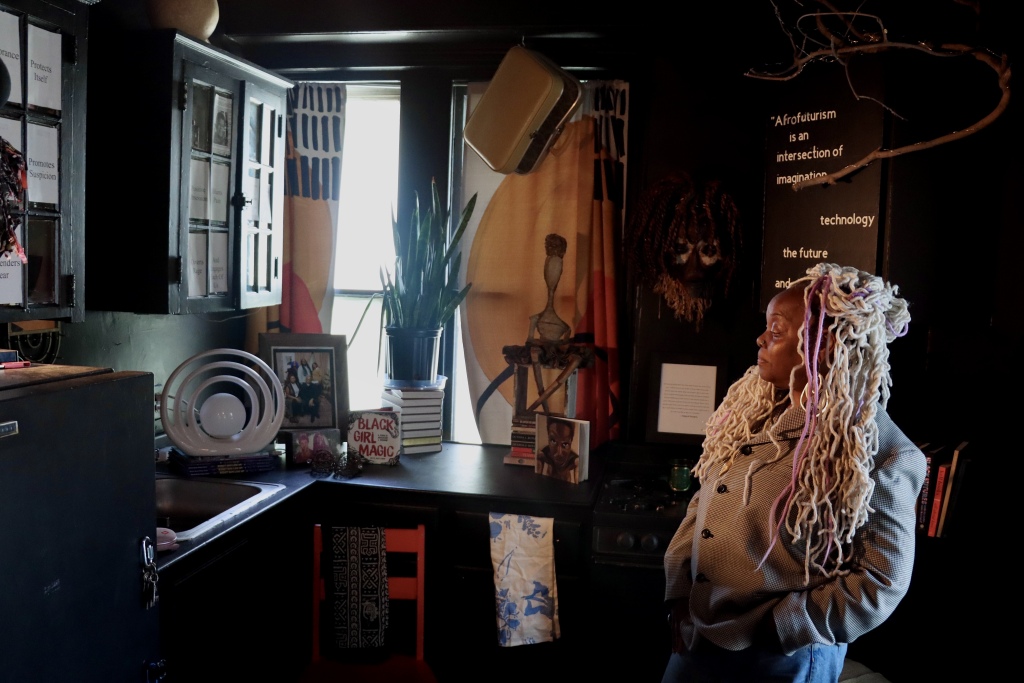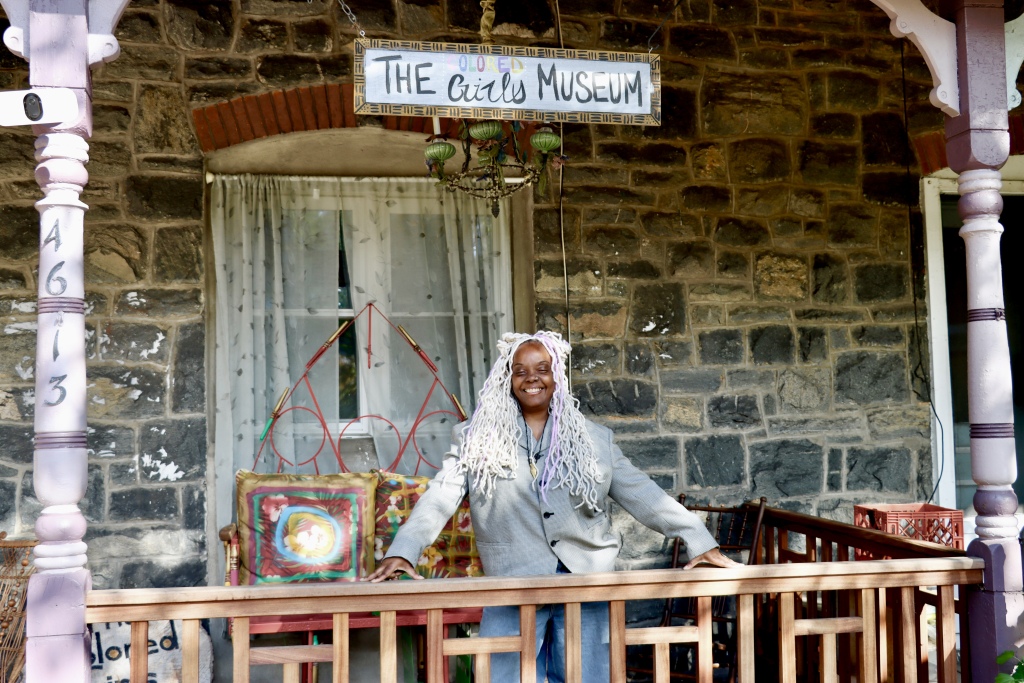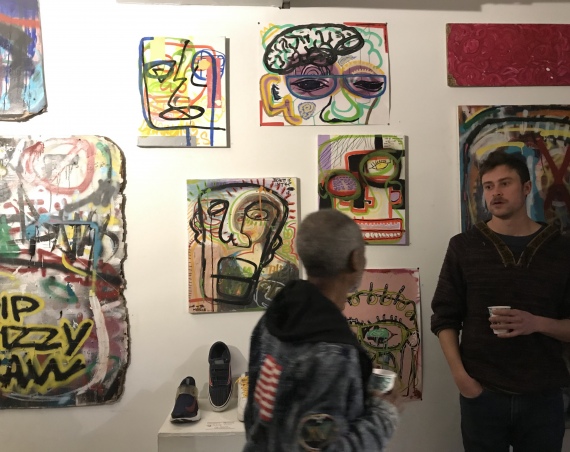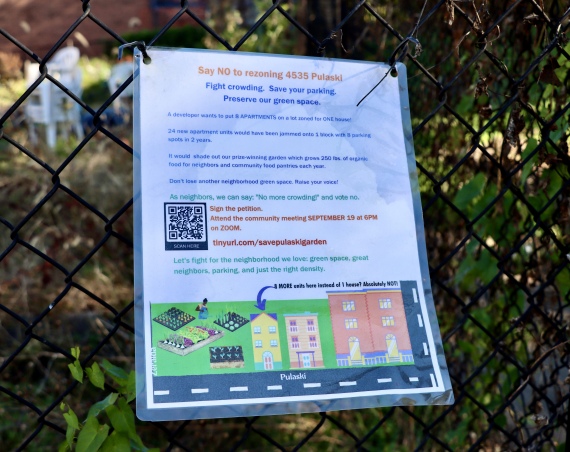“We are the only institution of our kind,” says owner Vashti DuBois, urging the ZBA to preserve the cultural haven for Black girls around the world.

The Colored Girls Museum (TCGM), located on Newhall Street in Germantown, honors the lives of ordinary yet remarkable women and girls of the African diaspora. Despite its popularity, the museum was hit with zoning challenges threatening its future earlier this year. At a Zoning Board of Adjustment (ZBA) hearing on November 15, the museum learned she (as gendered by the owner) would have to wait again to know her fate.
Vashti DuBois, the creator of TCGM, describes the essence, saying, “The Colored Girls Museum is a memoir museum. We celebrate the ordinary colored girl through the submission of art and artifact, which is significant to our experience.”
TCGM is not just a cultural institution but a lifeline for its founder. It played a crucial role in securing her home against foreclosure after she faced financial challenges following her husband’s death. DuBois narrates a tale of resilience intertwined with the museum’s origin.
“I raised my family here. I watched my neighbors’ children grow up here. My neighbors and I have grown old together, have grown middle-aged together. Our children have left home,” Ti reflected on the significance of her home in Germantown, which nearly slipped away due to financial struggles.
After her husband’s untimely death, the house went to sheriff’s sale three times. The means to rescue the house from foreclosure came from a source both tragic and necessary — the settlement from her husband’s accident, colloquially referred to as “blood money.” These funds became the financial cornerstone, preventing losing her home and, by extension, TCGM.
DuBois highlighted the deep connection between her family’s story and the house: “This is a monument to a moment and to a family, not just my family because our story, sadly, isn’t a unique story in the black community.”
DuBois’ grief gave inception to a museum that became a cultural haven for the world and a financial stabilizer for her family, emphasizing the link between personal narratives and artistic preservation. TGCM celebrates black women and girls’ lives and the power of cultural institutions in shaping and preserving community stories.

She says the impact has been felt globally, as she recites common letters and notes to the museum, “Oh my God, I can’t believe that there is a place like this in the world, in the country, in the state, in the city.”
However, the museum is still at a crossroads due to zoning issues related to its location in a residential area. This has been a nearly year-long journey for DuBois, as she received a notice of code violation in April.
DuBois outlined the zoning challenge: “The refusals were for two things. One, you can’t have a library, museum, etc., with a twin. And the other was, you can’t have a museum library in a property that’s both residential and the museum library.”
On October 26, TCGM had a Registered Community Organization (RCO) meeting, and the four nearby neighbors who attended the meeting voted in favor of the museum. However, DuBois expressed that the situation is more complex than traffic or parking. The main concern is whether the building can be used for the intended purposes.
DuBois says that over 50 people were on the call and showed up in support of TCGM. DuBois expressed gratitude for the local support, saying, “This process has been really affirming. It gave me something I didn’t know I needed, which is a sense of our value here locally.” The museum not only has a global impact but is also deeply rooted in its community.
In the recent ZBA hearing, attorneys Eileen Quigley and Damaris Walker represented the museum. They presented their case for a variance at 40613 Newhall Street and stated that they had all their documents except the Certificate of Tax Clearance (A statement from the city certifying your tax payments are up to date). During the hearing, the Chair, William Bergman, conducted a session where various participants were asked questions, gave testimonies, and made statements.
DuBois reiterated the mission of TCGM and testified about preserving ordinary colored girls’ stories, adding, “We are a public ritual for the protection, praise, and grace of ordinary women and girls of the African diaspora.”
The attorney clarified that the variance sought was explicitly for the use of libraries and cultural exhibits, not for multiple principal uses on the lot, meaning that the house would no longer be used for residential and museum use, just museum.
DuBois told Germantown Info Hub that “moving is only a hardship because moving is a pain, but I am happy to do so if it secures TCGM’s future.”
DuBois and Quigley addressed questions from the board. They underscored the positive impact the museum has had on the community, emphasizing its role as the 19th museum in the Historic Germantown Freedom’s Backyard historic and destination site coalition to preserve local cultural assets.
Owners of the other side of the Victorian Twin where TGCM stands, Diane and Leonard Thompson, submitted a letter expressing support for the museum and showed up in support of their neighbor. Leonard Thompson addressed the ZBA Board on behalf of the pair, about the character of both DuBois and TCGM, saying, “Integrity is certainly a byword for her, and we willfully support this and hope you do also.”
There were over 60 letters of support, and community members, including Suzanne Ponsen, Catherine Brown, and Oscar Beissert, strongly supported the museum during the public comments section. Brown emphasized, “There is a lot of coverage so that folks can know that we are very much in support and need as a community, The Color Girls Museum.”
Charles Richardson showed up on behalf of the office of Councilmember Cindy Bass, stating, “Councilwoman [Cindy Bass] is supportive of this granting the variances without any provisos.”
Quigley concluded the hearing by restating TCGM’s strong community support and asked the board to approve the variance. After hearing testimonies and reviewing exhibits, the ZBA closed the record for the case and decided to hold a new session to deliberate on the museum’s variance request. The decision will be made after TCGM receives the Certificate of Tax Clearance.
TCGM continues its important work, with ongoing installations at various locations showcasing Black girlhood’s strength and resilience. The upcoming variance hearing will be critical for The Colored Girls Museum, holding the fate of the physical embodiment of the ongoing struggle for recognition, acceptance, and celebration of Black ordinariness in its most extraordinary form.
DuBois spoke at the ZBA about the practical necessity of continuing the mission and vision of the TCGM, stating, “We have researchers. We have fellows. We have work-study students. We have interns. So they would all be out of relationship with the Color Girls Museum and or out of work, including myself. But perhaps we also have relationships with funders, so we’ve been funded. And so we would also be trying to address how we would make restitution to the people who funded us to do this work for which we’ve been recognized.”
She closes, saying, “But perhaps more importantly, it would be a slap in the face to women and girls of the African diaspora, both here in Philadelphia and nationwide. We are the only institution of our kind.”



